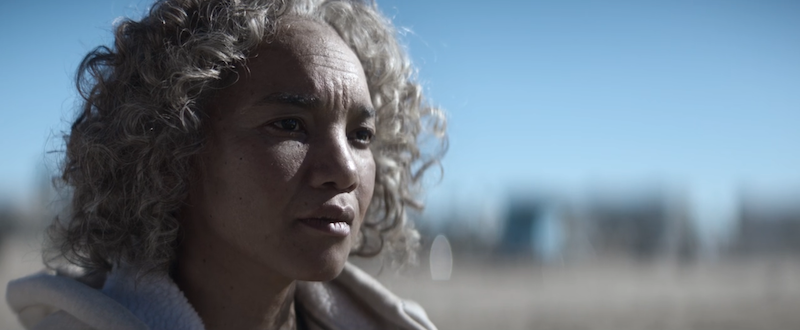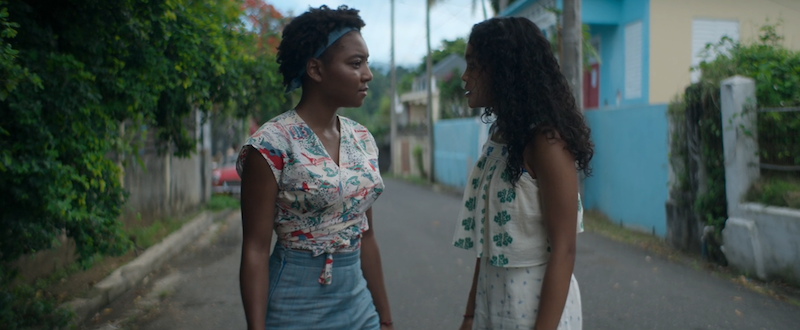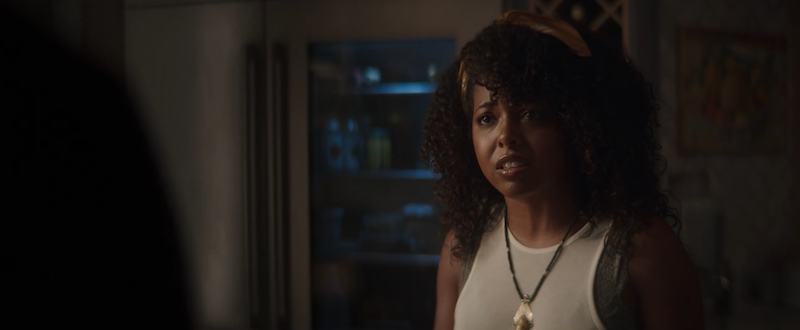Black Cake, Hulu’s stunning adaptation of Charmaine Wilkerson’s best-selling debut novel of the same name, opens with urgency: A young woman in a wedding dress sprints through the trees to the awaiting sand and dives into the ocean while sirens wail in the distance. It’s not until the end of the first episode we learn what has her running with such desperation. The answer is as complex as the dessert the show is named for.
If you ask anyone with Caribbean heritage about black cake, the chances are high that they’ll all have a story and a recipe; the chances are even higher that those stories and recipes will share the same bones, but will have special and unique ingredients. My mother and father are from the tiny Caribbean island of Grenada, and they both came to the United States as teenagers. With them they brought rich history, culture, and traditions that I will forever cherish.
For as long as I can remember, Christmas and black cake (or fruit cake, depending on who you ask) have gone hand in hand. Memories of fruit soaking in rum, the smell of spices wafting through the kitchen, and the inevitable “no, not yet!” when my brother and I begged for some icing (there was always an iced version and a plain one), are clear as day in my mind. Now, I’m almost afraid to admit this, but black cake is not my favorite dessert. However!! That fact does not prohibit me from appreciating the love, the culture, and the flavors that are layered into each piece.
At this point you might be thinking, “Nic, this is a television review, not an episode of Bake Off, what gives?” Well reader, the richness and complexity of the ingredients and flavors of black cake just so happen to be the perfect representation of the many interwoven identities that make up our main character, Eleanor Bennett.

“I’m not anything like I used to be… I still remember that girl.”
When Eleanor dies of a brain tumor, she leaves behind a mystery for her children Byron and Benny (affectionately, “B and B”) to solve through voice recordings she made near the end of her life. She also instructs them to share a slice of a small black cake she left in the freezer for them “when the time is right.”
Byron, an overachieving oceanographer, and Benny, a bisexual artist and musician, have been estranged since Benny came out at Thanksgiving eight years prior. They decide to put aside their differences and begin listening to their mother’s story; a story that begins with a confession: The woman they knew as Eleanor Bennett did not grow up in an orphanage as she always told them, and in fact, Eleanor was not her real name.
“Eleanor” was born and grew up in Jamaica as Coventina (Covey) Lyncook, the daughter of a Black mother and Chinese father. Through a combination of voiceovers and flashbacks, we learn that Covey spent her teenage years raised by her overprotective father Lin, because her mother left when Covey was 11 years old. Covey is a take-no-shit teenager who is a star swimmer with dreams of competing internationally. She spends her days training with her best friend Bunny, and they have big dreams of leaving the island together to swim all over the world. Unfortunately, Lin is deep in debt thanks to his gambling on cock fights, and to clear those debts, he offers Covey’s hand in marriage to an infamous loan shark.
Covey’s relationship with her father is tumultuous to say the least. She feels obligated to keep giving him chances as the parent who stayed, because in those moments when she really needed someone, her Pa always showed up. But how far can obligation take you when the person you count on literally sells you as a means to a financial end?
Despite having struggles at home, Covey finds solace in her boyfriend Gibbs, and, perhaps more importantly, Bunny. The two are inseparable, swimming together, joking together, sharing their dreams. It’s a closeness that mirrors many formative relationships I can remember having; especially because Bunny’s feelings for Covey are a bit more than platonic. Black Cake does a beautiful job alluding to Bunny’s queerness before she eventually comes out to Covey, who begs her best friend to hide who she is because in 1960s Jamaica even whispering about homosexuality could get you killed. It’s a scene that is both beautiful and painful to watch; Covey immediately accepts and embraces her friend, while also advising her to hide her true self. While this is Covey’s story, the relationship between her and Bunny is what gives the show so much of its heart.

“She is hard on herself.”
In the present, Byron and Benny react very differently to learning about their mother’s truth. As Byron struggles with the idea that his mother wasn’t the person he thought her to be, Benny finds comfort in the fact that her mother had “mess” in a way that feels familiar. And as Black women, isn’t that what we want to be afforded? A chance to be messy and vulnerable instead of tidy and unbreakable? We are rarely one thing and Covey is proof positive of this.

“She is messy, but she’s kind.”
The title of each Black Cake episode represents an identity that Eleanor assumes throughout her life, be it a name or a role. And through the first three episodes, we follow Covey, Coventina, and eventually Eleanor as she flees Jamaica and attempts to make a life for herself, first in London and then in Edinburgh. We watch as the girl who couldn’t help but stand out in Jamaica becomes invisible and small in Europe, begging to be seen. She manages to find small things that bring her the comfort and reminders of home, but her safety depends on her relative anonymity.
Not only is Black Cake visually stunning, but it also boasts an impressive cast. Adrienne Warren (The Woman King and Broadway’s TINA – The Musical) is incredible as Benny, and Mia Isaac (Not Okay) anchors the series with her award-worthy performance as Covey/Eleanor. Chipo Chung (Silo, Into the Badlands) plays present day Eleanor and lends her voice as narrator. In one such narration, she explains that black cake evolved from the British plum pudding that the colonizers introduced to the West Indies. It began as a marriage of cultures and developed into a delicacy as rich and varied as the islands themselves.
Part family drama and part murder mystery, Black Cake is about family, identity, and the ways our choices reverberate through our future. It’s about the stories we tell and more importantly, the ones we don’t, whether out of love, protection, fear, or survival.
The first three episodes of Black Cake are now streaming on Hulu with a new episode available every Wednesday.


